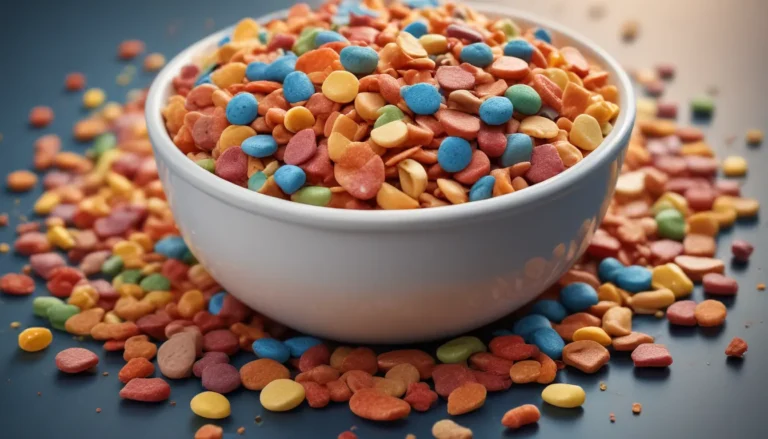The pictures in our articles might not always show exactly what the text is talking about. We use these images to make the article more interesting and eye-catching. They are there to add to the text, but not to replace it or show every detail.
If you're a fan of fizzy drinks, chances are you've sipped on a can of Coke at some point. This iconic beverage has been a beloved choice for many generations, offering a refreshing and bubbly taste. But have you ever stopped to wonder what exactly is in a can of Coke and how it impacts your nutrition? In this detailed guide, we will delve into the nutrition facts of a can of Coke and uncover the key elements that make up this popular fizzy concoction. From calories and sugar content to various additives and potential health effects, we will explore it all. Whether you're a Coke enthusiast or just curious about what's in your favorite carbonated drink, keep reading to discover the fascinating nutrition facts about a can of Coke.
Key Takeaways:
- A can of Coke has 150 calories, 39 grams of sugar, and 34 milligrams of caffeine.
- Opt for water as a healthier option for hydration.
- Enjoy Coke in moderation due to its high sugar content and environmental impact.
Calories
A single can of Coke contains approximately 150 calories.
Sugar Content
Each can of Coke packs around 39 grams of sugar, equivalent to roughly 9 teaspoons.
Caffeine
Coke contains caffeine, with an average can providing about 34 milligrams of this stimulant.
Sodium
One can of Coke contains about 45 milligrams of sodium.
Carbohydrates
A can of Coke contains about 39 grams of carbohydrates.
Artificial Sweeteners
Coke Zero and Diet Coke use artificial sweeteners instead of sugar, resulting in lower calorie and sugar content.
Phosphoric Acid
Coke contains phosphoric acid, which contributes to its tangy flavor and acts as a preservative.
Caramel Color
The brown hue of Coke comes from caramel color added for visual appeal.
Serving Size
A standard serving size for Coke is one can, which is 12 ounces or 355 milliliters.
Carbonation
The carbonation in Coke gives it a refreshing fizz.
Nutritional Value
Coke does not offer significant nutritional benefits, as it is high in calories, sugar, and artificial ingredients.
Hydration
While Coke can contribute to your daily fluid intake, water remains a healthier choice for hydration.
Worldwide Popularity
Coke is one of the most globally recognized and consumed soft drinks.
Cultural Icon
Coke's branding and advertising have cemented it as a cultural icon, with its red and white logo known worldwide.
Diet Options
For those looking to cut back on calories and sugar, Coke offers diet and zero-sugar options.
Compatibility with Food
Coke is often enjoyed with meals and pairs well with fast food or snacks.
Marketing Strategies
Coca-Cola has employed various marketing tactics over the years to promote its brand.
Environmental Impact
The production and disposal of Coke cans contribute to environmental concerns, such as waste and carbon emissions.
Moderation
It is advisable to consume Coke in moderation to maintain a balanced diet and reduce health risks.
Conclusion
Understanding the nutrition facts of a can of Coke is crucial for making informed dietary choices. While Coke can be enjoyed as an occasional treat, moderation is key due to its high sugar and calorie content. Use the information provided in this guide to help you better grasp the nutritional value of this popular beverage.
Frequently Asked Questions
- How many calories are in a can of Coke?
- A can of Coke typically contains around 140 calories.
- How much sugar is in a can of Coke?
- A can of Coke contains approximately 39 grams of sugar.
- Does Coke contain caffeine?
- Yes, a can of Coke typically contains around 34 mg of caffeine.
- What other ingredients are in a can of Coke?
- Besides carbonated water, sugar, and caffeine, Coke also contains phosphoric acid and natural flavors.
- Are there any nutritional benefits to drinking Coke?
- Coke does not provide significant nutritional benefits. It is high in empty calories and lacks essential nutrients.
- Can drinking Coke regularly lead to weight gain?
- Regular consumption of sugary beverages like Coke can contribute to weight gain due to their calorie content.
- Is it safe to consume Coke during pregnancy?
- It is generally recommended to limit or avoid caffeinated beverages like Coke during pregnancy. Consult your healthcare provider for advice.
- Are there healthier alternatives to Coke?
- Opt for healthier alternatives like sparkling water, infused water, or unsweetened herbal tea for hydration without added sugars or caffeine.






